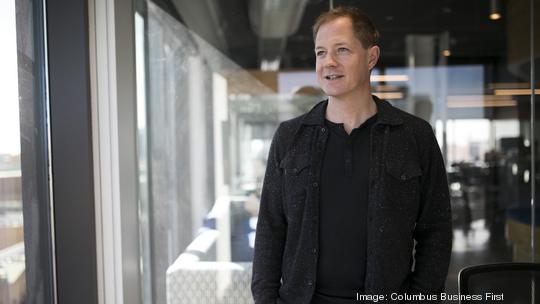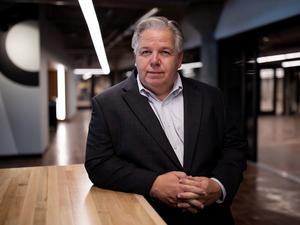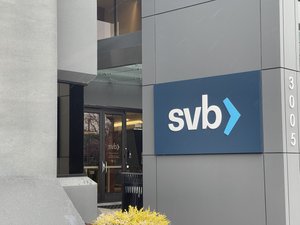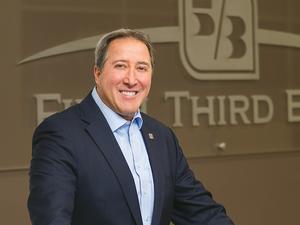
The crisis was averted in the end, but the sudden collapse of Silicon Valley Bank triggered a very real existential crisis for more than one-third of Drive Capital LLC's portfolio.
From Thursday morning through Sunday evening, the Columbus-based venture capital firm's partners and board members were exchanging constant calls and emails with founders, including ones whose payroll checks weren't clearing, said Chris Olsen, Drive co-founder and partner.
Olsen credited Cincinnati-based Fifth Third Bank and Columbus-based Huntington National Bank with herculean efforts to help startups move funds and keep their doors open through the weekend, before anyone could predict federal action would thaw their frozen cash.
"We are in a bizarrely business-as-usual case now, despite what was an incredibly challenging set of circumstances last week," Olsen said.
"This was a very material threat to a large chunk of our portfolio … and also Drive itself. We were able to put our portfolio in a position where no company would have missed payroll at least in the first seven days. (As of Monday,) all of our companies have full access to all of their deposits."
The outlook was the opposite at the beginning of the crisis. Without access to their own cash, 36 Drive startups were at risk of shutting down, Olsen said, and with many around the country in the same spot, millions of jobs were at risk. Drive did not disclose which companies had ties to SVB; the firm has at least three portfolio companies based in Cincinnati.
Here's how it unfolded:
Drive was celebrating a big week. The firm publicly announced Wednesday that it had set aside $80 million in seed funds and hired general managers in four new cities to replicate the type of hands-on incubation that brought Columbus companies from idea stage through unicorn status.
"I was supposed to make dinner and see my kids and spend time in the park with the dogs," Olsen said.
Thursday, Drive's partners quickly morphed into a fire brigade – VC firms and startups around the country had started a run on Silicon Valley Bank.
This is an industry that takes risks and stares down crises daily, Olsen said. But something as fundamental as cash in a checking account is not supposed to be risky.
"Everyone is obviously discovering there’s a single point of failure in a lot of businesses that nobody realized was there," he said.
First, Drive had to figure out which of the more than 100 companies in its portfolio had deposits at SVB. There were 36 in total.
Drive has $2.2 billion in assets under management under various funds established over the past decade, but that doesn’t mean it’s sitting on that much cash. VC funds represent commitments from limited partners like pension funds, banks and other institutions; the money is drawn down for specific transactions such as management fees or sending a check to a startup.
The firm is not disclosing the amount of its SVB deposits. It started to transfer funds to other banks, and sent affected companies step-by-step instructions on how to do the same, including names and contact information for bankers.
"We got a good chunk (transferred), but not everything," Olsen said.
Fifth Third and Huntington set up "tiger teams" to help startups open new accounts – typically a much longer paperwork-filled process, including navigating federal requirements to ensure a customer's identity.
Without skipping steps, Olsen said, the banks definitely sped up the process. (Representatives with the two banks were not immediately available for comment.)
By Friday morning, when the FDIC shut SVB down and took receivership, 15 Drive companies still had all their funds stuck there.
One startup had already processed payroll for hundreds of employees, and the founder had to tell the staff there was a chance the money would not arrive as scheduled Monday.
"Those were the hardest (conversations)," Olsen said. "It was a super emotional day."
Olsen praised transparency from founders, who "did a wonderful job of shoring up confidence in their ranks."
The FDIC, Federal Reserve and U.S. Treasury announced Sunday evening all SVB customers could access all their funds on Monday morning, overriding the $250,000 limit on federal deposit insurance.
Some uncertainty lingered until those withdrawals, Olsen said.
From now on, Olsen said, Drive will advise every portfolio company to ensure it has "redundant bank infrastructure" and establishes treasury management policies.
Before the feds acted, the Ohio banks already had buffered Drive's companies, Olsen said – "a wonderfully amazing example" of the firm's thesis that it's best to build startups outside of the typical coastal VC hubs.
"The next crisis is going to come eventually – and knowing you have great neighbors that are going to help you out means the world, and it changes your risk profile," he said. "It means you’re not building a company alone on an island. You’re building it with an entire community that’s ready to help you out."








